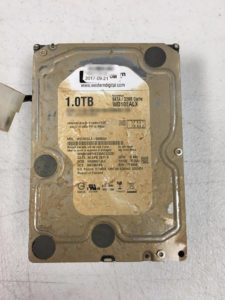
A hard drive with severe flood damage.
Hurricane Helene made landfall on September 26, 2024, has caused significant damage and killed at least 41 people across Florida, Georgia, and the Carolinas.
At Datarecovery.com, we anticipate an influx of water-damaged hard drives, solid-state drives (SSDs), and servers over the next several weeks. The good news is that flooded media is often recoverable, provided that it’s treated as soon as possible in a professional data recovery laboratory.
Here’s a quick introduction to how hard drives and solid-state drives (SSD) are impacted by flooding, along with steps to take to optimize the chances of successful data recovery.
Hard Drives, Solid-State Drives and Water Damage
Hard drives store data on rotating platters. A mechanical arm with a read/write head accesses the data as the platters spin. Water can damage the electronic components of the drive, but the data itself often remains intact on the platters. The contaminants in the water can also leave a residue that corrodes the metallic components.
For hard drives, flood damage can lead to the following failure scenarios:
- Corrosion: Contaminants accelerate the corrosion of metallic components, including platters and read/write heads.
- Stiction: Residue from dirty flood water can cause the read/write heads to stick to the platters, leading to physical damage.
- Motor Failure: Debris can jam the motor that spins the platters, rendering the drive inoperable.
- Head Crash: Contamination can cause the read/write heads to crash onto the platters, scratching the magnetic surface and destroying data.
Solid-state media stores data electronically, and water damage is a more significant issue as a result. Floodwater can cause short circuits, potentially frying the controller chip or memory chips that store your data. The contaminants present in floodwater can leave corrosive residues that damage the electrical connections and components over time.
For SSDs, the primary failure scenarios include:
- Short Circuits: Water can create conductive paths across the circuitry, leading to short circuits and immediate data loss.
- Corrosion: Contaminants in the water can corrode the delicate circuitry and connections.
- Data Corruption: Electrical surges caused by water damage can corrupt data, rendering it unreadable.
- Controller Failure: The SSD’s controller chip, which manages data storage and retrieval, is particularly susceptible to water damage. If the controller isn’t functional, the data isn’t accessible.
Optimizing Data Recovery for Water-Damaged Media
If your hard drive or SSD has been exposed to water, take these steps immediately:
- Do not turn on the device. This can cause electrical damage; for hard drives, powering on the device could lead to physical damage if the read/write heads are in contact with the platters.
- Do not attempt to dry the device. Don’t add water, either.
- Remove the hard drive from the computer, if possible. Package it in a sealable plastic bag or anti-static bag.
- Contact a professional data recovery service. Time is a crucial factor. Look for a company that operates real laboratories at its locations (not mailing offices, which may delay treatment).
Professional Data Recovery for Hurricane-Damaged Media
Datarecovery.com offers free media evaluations and our no-data, no charge guarantee, ensuring you have peace of mind throughout the recovery process. If we cannot recover your data, there is no charge for our services.
If you’ve lost access to your data due to Hurricane Helene — or if you’ve lost data for any other reason — we’re here to help. Call 1-800-237-4200 or schedule a risk-free evaluation online.




